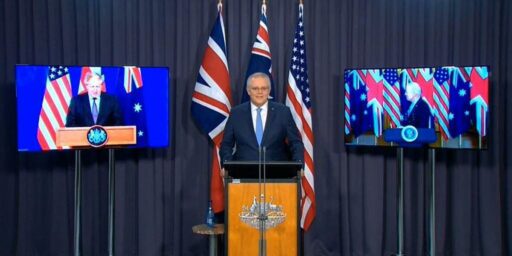DIPLOMATIC DEBACLE
Michael Barone’s US News piece is the best counter-argument to Daschle’s charge that Bush’s failed diplomacy led to this war that I have read. (PoliBlogger also has some interesting thoughts on the subject.)
The general complaint is that George W. Bush and his administration have been throwing sand in the eyes of the Europeans for two years, and so it is no wonder that the United Nations Security Council failed to agree on an 18th resolution condemning Iraq. This administration has baldly rejected the Kyoto Protocol and the International Criminal Court treaty; it abrogated the antiballistic missile treaty of 1972. It has shown contempt for international projects dear to European hearts and so has alienated Europeans to the point that they have rejected our call for military action to disarm Saddam Hussein.
The problem with this complaint is that it is just not true.
The list of European governments supporting us on Iraq is long. It is worth repeating. First and foremost, the United Kingdom of Great Britain and Northern Ireland. Spain. Portugal. Italy. Denmark. The Netherlands. Ireland. Poland. The Czech Republic. Hungary. Estonia. Latvia. Lithuania. Slovenia. Slovakia. Romania. Bulgaria.
And who is against? France. Germany. Belgium.
But, as we all know, if France isn’t with you, it’s “Unilateralism.”
And was their opposition caused by our rejection of Kyoto, the ICC and the ABM treaty? Not at all.
Germany is opposed because Chancellor Gerhard Schroeder was in danger of losing the September election. He decided to appeal to the very small number of German voters who support the neo-Nazi and former Communist parties by opposing the United States and making nationalist sounds. He succeeded, narrowly. Analysis of the election returns shows that he reduced the percentages the neo-Nazi and former Communist parties got just enough to give his Social Democrats a narrow parliamentary majority.
Up until August 2002, Schroeder had solidly supported the United States on Iraq. He assured George W. Bush in Berlin and in the Oval Office that he would stick with him on the issue. When I was in Berlin in July, I was assured by high-level Social Democrats and Christian Democrats, including the then defense minister, that the consensus in Germany was to support the United States on Iraq. Schroeder switched in August in a cheap political maneuver to win the votes of people who believe in totalitarian government. This was not a principled response to Bush administration diplomacy. This was the response of a second-rate, shifty politician on the verge of a well-deserved electoral defeat. It tells us nothing about long-term German policy. Schroeder’s party has since been repudiated in state elections. It is unlikely that he will be chancellor very much longer. It is not at all clear that his current position will be followed by later German governments.
France is different. On November 8 France voted for Resolution 1441, which recognized that Iraq was in material breach of its obligations under other United Nations resolutions, which demanded immediate compliance with them, and which stated that in the absence of complete compliance there would be “serious consequences.” In other words, Iraq must immediately disarm or we would be justified in going to war. Then this year, France denied that Resolution 1441 meant what it said. It announced last week that it would oppose any resolution which called for military action in response to noncompliance. On an intellectual level the French position was inconsistent with its support of 1441. The motive was clear: France wants to cabin in the power of the United States. It sees us as a “hyperpower” whose strength is inconsistent with French interests.
There is nothing in France’s position to indicate that it would have done anything else if the Bush administration had made approving cooing noises about the Kyoto Treaty, if it had said it just wanted some minor modification in the International Criminal Court, if it had refrained from saying out loud that it was abrogating the ABM treaty. The French objection is more fundamental. It is opposing the United States because it is the United States. No amount of appeasement on these other issues would have changed its mind.
As for Belgium, it is a corrupt and powerless country which sails along in the wake of France. It is not worth serious comment.
I must admit, I’ve been studying international relations for years and know almost nothing about Belgium. I know a lot about the United Kingdom and most of the other countries on our side. As for France and Germany, they are of course major powers. Germany has even been a strong ally for most of the postwar period. But domestic politics almost always trumps loyalty to one’s international friends. Which makes Tony Blair’s standing so staunchly with us in the face of amazing pressure back home all the more admirable.
It was not as clear, as perhaps it should have been, how perfidious the French would be. Bush let Blair go ahead, and actively supported his drive for an 18th resolution. In retrospect, that seems a mistake, at least from an American perspective, though it may look different from Westminster. But it was not a “disastrous” mistake. We still have as good a warrant for going to war as we had before. And, as those who accuse Bush of showing contempt for Europeans should note, if there was a mistake, it was one made in accommodation to a European ally.
Quite so.




